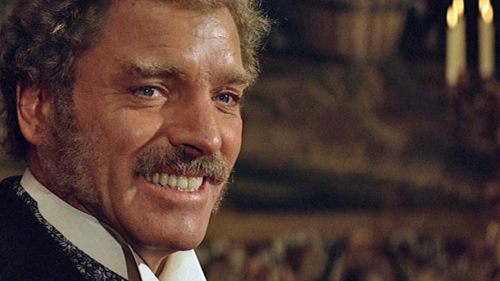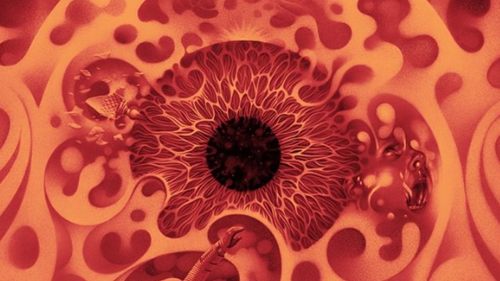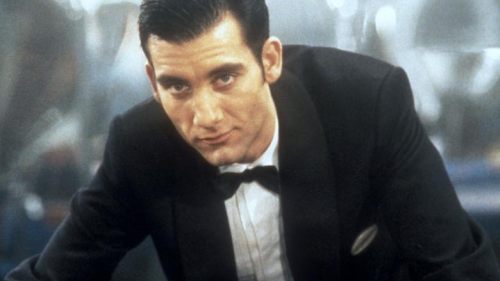A Case For Greatness: EYES WIDE SHUT
Classics never die, but they seldom get replaced. Cinema is populated with enduring, venerated works of art that deservedly adorn list after list, but those lists are rarely updated, and less often expanded to include new, equally worthy entries. Organizations that give out annual awards are constrained not only by the limitations of formatting, but perspective - they can’t anticipate which film will survive the buzz of its initial acclaim or success and become part of the cultural firmament. And then there are just certain films or even genres that too infrequently receive the critical attention they deserve, are too obscure to break through to bigger audiences, or just aren’t taken seriously enough to merit consideration alongside the ones we “all” already know we love or respect. A Case For Greatness, this series, tries to argue for, and to champion, forgotten or underappreciated films in a variety of genres that may be worthy of being called “classics.”
Eyes Wide Shut
As opinionated as I’ve always been about movies, professionally and personally, I like to kid myself that once each year I fully “get” one movie. Everyone else is missing what it’s about, I think. I see what the filmmaker is really doing, I tell myself. More often than not, some personal experience has merely aligned my sensitivities with their intentions, or helped underscore a theme. But one of the first times I had that sort of epiphany was after watching Eyes Wide Shut, Stanley Kubrick’s final film. I’d already long since cultivated an obsession for his work by the time it was released in July 1999, but I’d really only just started experiencing some of the relationship challenges contained in the film, much less coming to terms with their underlying emotions. All of which is why, in spite of my certainty that I “understood” exactly what Kubrick intended, it took me a good 20 years to be able to put together my thoughts about this masterpiece, a dazzling technical achievement and methodical and merciless exercise in storytelling that, at its essence, is a horror film, for men, about female desire.
Sure, there’s all of that business about an orgy, a woman who may or may not have been murdered, and the accumulating deceptions that exasperate and terrify Dr. Bill Harford (Tom Cruise, whose performance here feels like a prelude to the dressing down he later receives in Paul Thomas Anderson’s Magnolia). But Eyes Wide Shut is a film about masculine entitlement, deconstructed and dismantled by female sexuality, both as an idea and in action. The first shot, of Alice (a seldom-better Nicole Kidman) in heels, shedding a dress, is deceptive: her objectification suggests the film will offer a sex-fueled romp, distracting the audience from the emotional carnage yet to come. But it’s immediately undercut by a shot of Bill walking in on her using the toilet, which is a thing that women almost never do, and certainly never in movies starring women as beautiful as Nicole Kidman. The context of their clothed relationship is bourgeoise, but utterly domestic and unsexy, as Bill scrambles to remember the babysitter’s name on their way out the door to an impossibly fancy soiree thrown by his wealthy patient Victor Ziegler (the late, great Sydney Pollack).
The party is a lowkey tsunami of temptation: Alice dances with a Hungarian lothario named Sandor (Sky du Mont, because of course that’s his name) who seduces her with intoxicating rhetoric about the joys of extramarital sex, while Bill wanders off with a model who’s eager to repay him - with help from a gamine friend - for a kindness he paid her once on the streets of New York. It’s easy to look at the two women as his conquests, rather than to look at him as theirs, but they prove to be the embodiment of what he later learns from Alice is a woman’s natural desire to explore her (or more accurately, their) sexuality. Bill is ultimately waylaid when Ziegler asks for his help reviving Mandy (Julienne Davis), a beautiful prostitute who overdoses on drugs not long after a liaison in his private bathroom upstairs. Later that night Bill and Alice make love, undoubtedly fueled by their encounters at the party; but is Alice thinking of Sandor, or someone else entirely?

The next evening, Alice and Bill smoke pot in their bedroom, and a conversation ensues where she asks if he slept with the two women. He asks about the man she was dancing with, and their playful expressions of jealousy soon turn more strident when he suggests that it’s “understandable” that her would-be suitor wanted sex, since she’s very beautiful, and as he argues, “we both know what men are like.” Kubrick’s escalation of this argument is masterful, and painfully recognizable, as Bill’s answers and explanations only get him into further trouble, culminating in the assertion that “women don’t think like that” - a dangerous generalization he soon comes to regret. “If you men only knew,” Alice says ominously. His insistence that she’d never be unfaithful is met with a devastating confession about his wife’s desires that sets the events of the rest of the movie in motion, an odyssey that shatters his complacency and speaks to a perhaps less sensational but no less important divide, a lack of understanding, between men and women.
Alice tells Bill that during a vacation they took the previous summer, she saw, just in passing, a young Naval officer who left her speechless and fueled an obsessive desire that she would have pursued if he’d given her even the smallest indication that he wanted her to. “I was ready to give up everything - you, Helena, my whole fucking future. Everything. And yet it was weird - at the same time, you were dearer to me than ever,” she adds, twisting the knife with a stoner’s obliviousness. Bill is stunned into silence, the foundations of his marriage seemingly ripped to shreds by the revelation that his wife not only has experienced moments of desire for other men, but can recall them with alarming specificity. His comfort and familiarity in the routines of their relationship has been uprooted, in a moment of unforgiving honesty.
But no sooner than Alice tells him about her all-consuming crush, Bill receives a call from Marion (Marie Richardson), the daughter of one of his patients who has died. In the cab on the ride to her apartment, he imagines an encounter between Alice and the Naval officer that never happened - which, perhaps most troublingly to his overactive imagination, she really seems to enjoy. Marion vaguely resembles Alice, and after going through the details of her father’s final moments, they make idle chit-chat where she reveals that she and her boyfriend Carl (Thomas Gibson) have plans to marry. Bill tries in earnest to comfort her, and she responds by kissing him, insisting that she loves him and does not want to move to Colorado with Carl. “Even if I were never to see you again, I want to at least live near you,” she admits. “I don’t think we’ve ever had a single conversation about anything except your father,” he retorts, as she says again, “I love you.” What was possibly, self-protectingly an isolated impulse of yearning from his wife has just been proven a truism among women: this random individual has created an elaborate and powerful fantasy around him, without his knowledge (much less reciprocity), and she’s willing to tear her own life apart to make it reality.
Perhaps more remarkable is the discovery that Carl looks almost exactly like Bill; certainly it seems vaguely understandable to develop an attraction to someone who’s different from your significant other, but there’s something profoundly disorienting about a crush who is, at least superficially, identical. Bill, of course, is reeling. He cannot get the image of Alice and the Naval officer out of his head. He is further emasculated when a group of frat boys inexplicably assault him, taunting him with gay slurs. So when a prostitute named Domino (Vinessa Shaw) invites him into her apartment to “have some fun,” Bill seems hesitantly eager to re-establish his sexual authority, and some sense of control - though he doesn’t seem to realize that she leads, and he follows. “I’m in your hands,” he says cheerfully. They are eventually interrupted, by Alice, who’s checking on him after visiting his patient, and Bill leaves.
Following an encounter with former classmate Nick Nightingale (Todd Field), Bill learns of the secret, opulent sex parties where anything goes, and which promise the possibility of sexual redemption after hs failed attempt at an interlude with Domino. But he needs a costume for the party, which leads him to an encounter with Mr. Milich (Rade Sherbedgia) and Milich’s daughter (Leelee Sobieski). It’s unclear whether Bill’s arrival is a real intrusion or it’s deliberately written into the escapades of Milich’s daughter and the two Japanese men she’s found cavorting with, but suffice it to say he’s increasingly unsettled - she’s Milich’s daughter, clearly underage, and yet seems to be fully aware of her effect on these men, including Bill. The next day, Milich offers her directly to Bill, further disorienting him as he tries to piece together the events of the night, and serving as another indication that the women around him, even in pubescence, can control their own sexual fates.
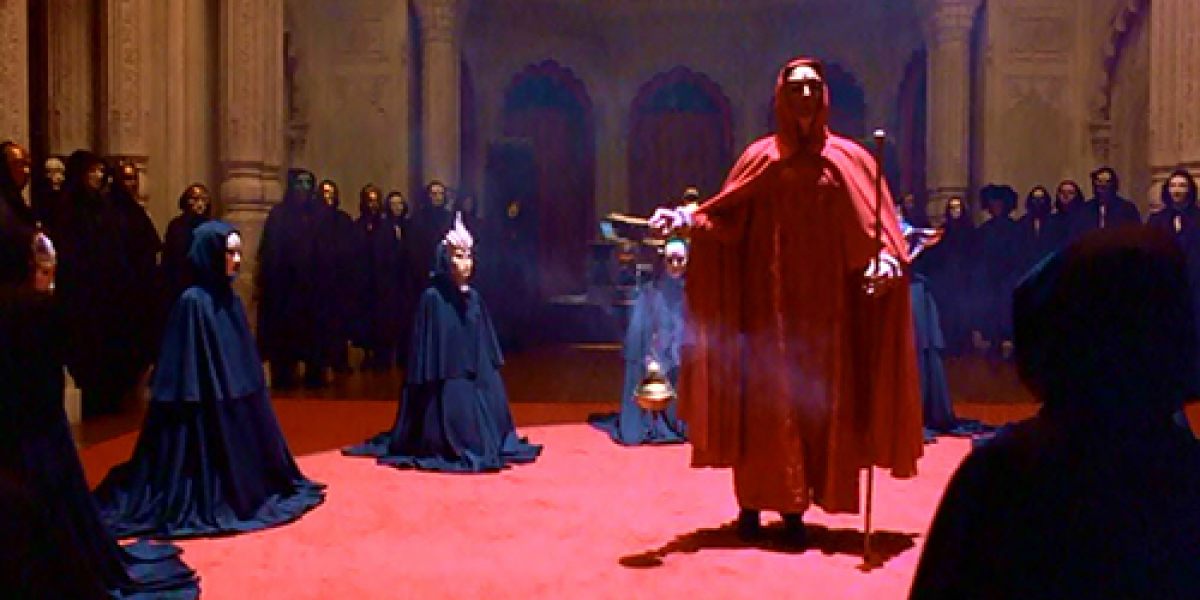
By the time he arrives at the actual orgy, Bill’s reflective interludes in the back of yellow cabs have become almost something of a punch line. He flashes back over and over again to the image he creates of his wife with the officer, haunted by a fantasy that is not his own. But at the estate, he seems not at all frightened, instead curious and undoubtedly excited at the prospect of some sort of pagan sexual ritual he is too naïve to realize can be far deadlier than his wife’s passing fantasy. But even in here, where the women seem like “sacrifices” to serve the male libido, they choose their partners. And unbeknownst to Bill, Mandy - Ziegler’s upstairs companion at the opening gala - chooses him, though to reciprocate his earlier care with protection instead of sexual gratification. She knows what goes on in the halls of this vast bacchanal, with whom, and at whose behest, and she knows that he does not.
What’s interesting about his tour of the grounds is how unsexy so much of it seems; the women, while nude, still wear masks, making much of their lovemaking, uh, logistically challenging, to say the least, and it’s hard to know whether the sex actually takes place in silence or if Kubrick drowned its sound underneath Jocelyn Pook’s dreamy, mysterious score. But what’s important is just how far Bill is out of his depths; he is wildly unprepared for the kind of sexual gamesmanship on display, and fails to heed repeated warnings from Mandy to leave before he is discovered by the event’s organizers, who won’t take kindly to the intrusion of an outsider. Once caught, Bill is forced to remove his mask, leaving him exposed and far more vulnerable than any of the women attending the party. It’s a truly terrifying moment for him, but one made more profound by the idea that women are often made to feel vulnerable in a similar way when they are around, and observed, and objectified by men.
And yet it’s a woman, Mandy, who agrees to “redeem” him, saving him from the humiliation of disrobing in front of the group, and whatever further “dire consequences” he would face at the hands of the party’s organizers. He is grateful for her sacrifice, simultaneously relieved and worried about what fate she will meet in his stead, and returns home exhausted and predictably dazed by the gauntlet he’s been through. Alice exacerbates his disorientation by telling him about a dream he’s just interrupted, where she first makes love to the Naval officer, then to “so many other men,” culminating in an act of hurtfulness and humiliation so cruel he’s right to have no idea how to respond: “I knew you could see me, and I wanted to make fun of you, to laugh in your face.” Cruise’s performance communicates the cumulative weariness of everything he’s actually gone through, as well as the absolute dejectedness of learning that his wife has continued to indulge her fantasies about the Naval officer - as well as other men - now at a subconscious level. Her desires have taken root more deeply than he can even understand, and he’s been cuckolded even in her dreams.
The next day, Bill goes to find Nick - presumably to apologize, but assuredly also to find out what happened after he left, including to Mandy, whose identity he still does not know. In place of Nick at Nick’s hotel is a desk clerk (Alan Cumming) who reveals that his former classmate arrived early in the morning, nursing a bruise, and looking scared as two imposing men hurried him through check-out. But what’s more immediately notable about the conversation is how the clerk regards Bill himself; Cumming plays the scene with a delightful sort of infatuation with Cruise, further underscoring the way in which Bill repeatedly ends up on the receiving end of the kind of objectification to which he and other might subject Alice and other women. Cumming isn’t especially understated here, but the effect is, to a man seeking information about what he believes may be life or death circumstances, an unsettling distraction.
After discovering that Milich, his daughter and the two Japanese men came to “an arrangement” with regards to the previous night, Bill is disturbed, not the least of which because Milich’s daughter is openly, almost confidently complicit. This moment feels a little bit like Bill’s “as a father to a daughter”-style epiphany, but Kubrick presents it briskly and moves on, occupied by the machinery of the mystery of the party. Despite, or perhaps because of, another warning from the party organizers, Bill becomes consumed by the need to find out the fate of Mandy, whose identity he still does not know, but he continues to go unfulfilled, or maybe more accurately unresolved in his sexual appetite. He even calls Marion, but Carl answers instead - though it seems unlikely he would know what to do or say had she picked up. Alice, meanwhile, has seemingly moved on from the confrontations, and returned to the business of parenting.
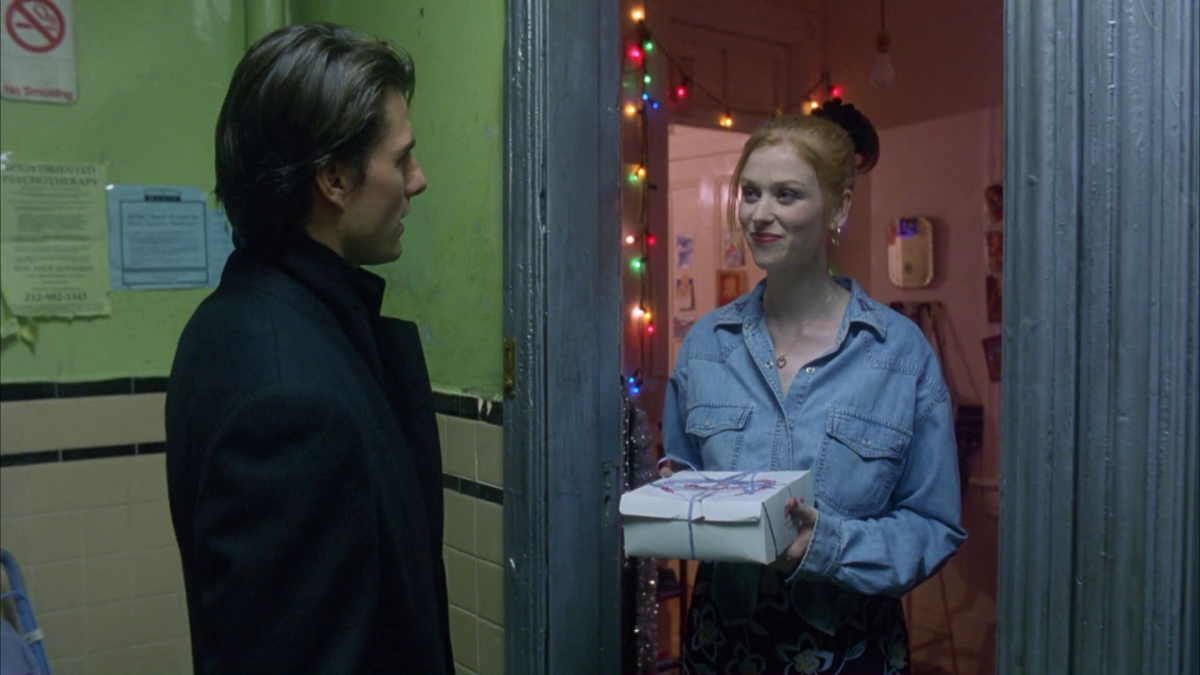
He next returns to Domino’s to consummate their encounter, but instead encounters Sally (Fay Masterson), making his most aggressive sexual overtures yet. But Sally reveals that Domino found out during the intervening time that she is HIV positive. There’s two ways to look at the revelation - that his pursuit of sexual gratification has become toxic and that he narrowly dodged a bullet thanks to Alice, or that Domino’s sexuality is destructive in a different way than, say, Alice’s - but the end result is the same: Bill remains ungratified, disempowered and more confused than ever. It’s not long after that he learns the fate of Mandy, the young woman who was “ready to redeem him:” she died from a drug overdose. Perhaps not coincidentally, just minutes after identifying Mandy’s body, he receives a call from Ziegler, who asks him to come by his house for a “chat.”
Ziegler reveals that he was at the orgy, and that he had Bill followed afterward. In a hectoring tone, he attempts to dissuade Bill from investigating Mandy, the party or anything else about the previous night. Ziegler, adopting the tone of a parent increasingly impatient with his child’s queries, effectively tries to gaslight Bill, arguing that the whole “redemption” business was all an act to frighten Bill into silence - never mind that Mandy is lying dead on a slab at the morgue. Ziegler vacillates between being glib and menacing; Bill is appropriately unconvinced.
But then there’s the mask. The one Bill rented for the party. He thought it lost when he returned the rest of the costume, but it’s sitting on his pillow, next to Alice, who sleeps soundly. Bill is terrified to discover it, breaking down in tears. It’s never explained how it got there, but the implicit threat against Bill investigating the party is underlined, in bold print. This is a man whose misperceptions about sex and desire and most of all, women led him down a dark and dangerous path, laid him low in his estimation, and control, of his own sexual identity, but more immediately threatened the seeming actual safety of his marriage. Alice has been honest, brutally, about her feelings, and she brutalized his ego, but there’s no sense that she actually will leave him. Bill has not, either with her or himself, and his exploration, his retaliation against these feelings of emasculation have undermined their marriage further than any of her vivid fantasies ever could.
Her desire is real but it’s theoretical. His is real and it’s wreaked havoc. The final scene is a trip to a toy store, and it’s almost like Alice is bringing two children in tow - Helen, their daughter, but also Bill, who’s completely lost his bearings and has no idea how to move forward. But Alice knows. She constructively suggests that his one night doesn’t define their relationship, just like her dream, her fantasy does not. Bill feebly suggests that they stay awake “forever” - the sort of well-intentioned but similarly misguided panacea that feels as likely to damage their reconciliation as he hopes will protect it. But she knows better what they need: to fuck. His sense of the future is cloudy, but hers is clear. And even if Bill misjudges her sexual needs, her desires, Alice does not. Does that make this a happy ending? I’m not sure. Perhaps not for their marriage, anyway. But it’s remarkable that in a movie as sexually charged as Eyes Wide Shut, was is, and remains, the most intriguing, and the most provocative, is not what’s going on in the characters’ loins, but what’s behind their eyes, and in their hearts. Next time you revisit it, make sure it’s with someone you love.

